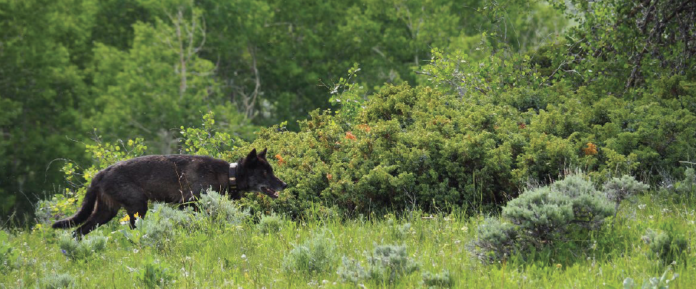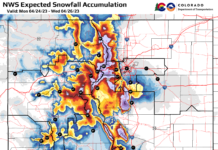
wolf near Walden is now thought to be female with a mate
by Marissa Lorenz
Colorado Parks and Wildlife (CPW) confirmed last week that a collared wolf living in Jackson County since 2019 is actually a female wolf and not male as previously determined.
Formerly labeled as M1084 and now properly identified as F1084, the black-colored wolf is known to have broken off from Wyoming’s erstwhile Snake River pack, having been collared by Grand Teton National Park (GTNP) crews in January 2017 and pinged nearby
in late 2018. But by 2019, it was observed near Walden, in Colorado.
However, it wasn’t until CPW staff captured and collared a companion gray wolf in February of this year that better data became available on travel patterns and other behaviors of the pair.
“As we continued to monitor the movement patterns of M2101 and F1084, CPW biologists noted a change that was consistent with potential denning behavior,” said Brian Dreher, CPW Terrestrial Section Manager, referring to the time during which pregnant female wolves enter dens to give birth to their pups.
“While we had conclusive proof that M2101 was a male, the change in behavior was enough to drive a deeper discussion about F1084 with our partners at Wyoming Game and Fish and Grand Teton National Park.”
The partner agencies pulled genetic information on F1084 and determined that the collared wolf had been mislabeled and is actually a female gray wolf.
“Confirmation that we have a male and female pair of gray wolves and observing what may be denning behavior in [Colorado] is an interesting development as we begin our planning and implementation process for reintroducing gray wolves to the state,” said CPW Director Dan Prenzlow.
Colorado voters passed Proposition 114 by a slender margin last November, directing CPW to develop a plan for reintroduction of the gray wolf to its former native habitat on the state’s western slope by the end of 2023.
In a state with a history written in agriculture, the predator had been hunted to a level of local extinction by the 1940s. And while the idea of reintroduction had come up before, it was opposed by many farmers, ranchers, and big-game hunters and, ultimately, rejected by the CPW Commission in 2016.
But more recent opposition cited reasons beyond the potential threat wolves pose to livestock and wild game. One common argument against the proposed bill was the fact that wolves are already naturally migrating back into Colorado, as confirmed through DNA when
a wolf was shot near Wolford Mountain Reservoir in 2015, by photo documentation of a pack in Moffat County, and by encounters with F1084 and M2101 in Jackson County.
And with a possibly-denning mom, the state might soon count its first-known wolf pups born in Colorado in nearly 80 years.
Although–“We have not yet determined if reproduction has occurred,” said Prenzlow, adding, “as we begin the discovery process with our Technical Working Group, we can now also observe how a naturally migrating pair is adapting here in Colorado and use that information to help inform plans moving forward.”
“The news of potential denning behavior of wolves in Jackson County is a real credit to Colorado Parks and Wildlife’s on-the-ground scientists,” read Governor Jared Polis’ statement in the CPW press release.
“We know wolves are resilient, hardy animals and in this case, two of them hundreds of miles from their home packs found each other and are now making a home in Colorado. While these wolves have a head start, I look forward to our state moving ahead with a well-planned and inclusive process to restore gray wolves in Colorado, fulfilling the will of the voters.”
In January, the Commission provided staff with “guidance to begin creating a robust, adaptive management plan to reintroduce wolves by the end of 2023.” Next steps include holding statewide hearings about “scientific, economic, and social considerations;” obtaining public input to keep the plan up- to-date; and applying state monies to “assist livestock owners in preventing conflicts with gray wolves and to pay fair compensation for livestock losses” due to wolves.
In the meantime, CPW says that it will continue to monitor the Jackson County pair, “using collar data, trail cameras and sighting reports to watch for any additional changes in behavior or denning behaviors that may indicate more wolves in the area.”
The agency warns that gray wolves remain a state endangered species, in spite of federal delisting in November 2020. Killing a wolf in Colorado is a crime punishable with jail time, fines and/or the loss of license privileges.
To learn more about wolves in Colorado and to stay informed about the implementation of Proposition 114, visit the CPW website at cpw.state.co.us.








